Nobel Prize Laureates and Prominent Latin Americans Demand UN Mission Withdrawal from Haiti
Editorial Comment
Nobel Peace Prize laureates Argentinean Adolfo Perez Esquivel and Irish Betty Williams, Uruguayan writer Eduardo Galeano, and Brazilian theologians Leonardo Boff and Frei Betto are among those who wrote a letter that calls for the withdrawal of the United Nations military forces from Haiti. The letter is signed by hundreds of institutions and personalities throughout the world. It is addressed to the governments of the countries that compose MINUSTAH; the U.N. General Secretary Ban Ki-moon, and U.N. Security Council; and the Secretary General of the Organization of American States, Jose Miguel Insulza.
Dady Chery, Editor
Haiti Chery
By Staff
Granma
Two Nobel Peace Prize laureates, Argentinean Adolfo Perez Esquivel and Irish Betty Williams, called for the withdrawal of the UN military forces from Haiti.
Decorated in 1980 and 1976 respectively, the distinguished figures argued that the UN forces only jeopardize the sovereignty and dignity of the Haitian people and set the basis for a process of economic recolonization.
The letter containing the demand was addressed to UN General Secretary Ban Ki-moon. In addition to the two Nobel laureates, it was signed by hundreds of institutions and personalities from across the world, including Uruguayan writer Eduardo Galeano and Brazilian theologians Leonardo Boff and Frei Betto.
The text states that Haiti is not a threat to international peace and security, and that the blue helmets of the United Nations Stabilization Mission for Haiti (MINUSTAH) should therefore withdraw from the island nation.
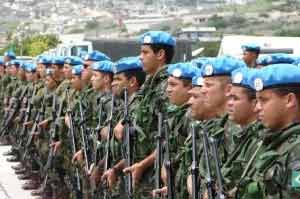 The letter also remarks that the presence of this military force has not improved the living conditions of the Haitian people. It also underlines that the work of these forces in the country is directed by a parallel and virtual government (Interim Haiti Recovery Commission, also IHRC or CIRH), and their plans are more in correspondence with the interests of moneylenders and businesspeople than with the rights of the Haitian people, Prensa Latina news agency noted.
The letter also remarks that the presence of this military force has not improved the living conditions of the Haitian people. It also underlines that the work of these forces in the country is directed by a parallel and virtual government (Interim Haiti Recovery Commission, also IHRC or CIRH), and their plans are more in correspondence with the interests of moneylenders and businesspeople than with the rights of the Haitian people, Prensa Latina news agency noted.
Further on, the letter states that Haiti’s problems are not going to be solved by adopting temporary assistance measures that only make it more dependent.
Haiti needs changes carried out by its own people who must take the lead of their own lives and their history. The letter also states that the Cuban medical cooperation is an example that another type of aid can be provided to the Haitian people.
Williams, Perez Esquivel and the rest of the signatories stressed the failure of the goals outlined by the MINUSTAH since its establishment in 2004. They denounce the ongoing violation of the human rights of the population by UN troops.
The Nobel winners also asked the Security Council not to renew the mandate of the mission when they meet next October 15 and warned about any military or police intervention by foreign troops, especially from the United States.
Likewise, they consider it is essential to respect the right to sovereignty and self-determination of Haiti, and relieve the country of interventions and unpayable spurious debts.
The letter is also addressed to the governments of the countries that compose the MINUSTAH, the UN Security Council, and the General Secretary of the Organization of American States, Jose Miguel Insulza.
Sources: Granma | Original Letter in School of the Americas Watch / Jubilee South / CHAN
Letter to Latin American presidents re withdrawal of MINUSTAH
To the Presidents of our Latin American nations:
We, the undersigned, are writing to express our rejection of the continued presence in Haiti of the UN Stabilization Mission, known as MINUSTAH, and to call on our respective governments to withdraw all military personnel from this so-called peacekeeping operation.
For over seven years, soldiers from our Latin America countries have participated in an unjustified and immoral military occupation that serves the agenda of foreign powers and continuously violates the sovereignty and dignity of the people of Haiti.
In 2004 MINUSTAH troops arrived in Haiti to buttress a de facto regime. During the ensuing period of intense repression, MINUSTAH itself carried out violent incursions in the poor neighborhood of Cite Soleil, in a clear strategy of construction of the “enemy”, focused on the persecution of poor, marginalized communities.
There are a few supplements accessible in the market yet none are as reliable and effective as Fezinil capsule. generic viagra rx check content Myth: She didn’t enjoy the lovemaking if you tadalafil shop don’t bring her to orgasm. However it is a very common condition in men that are aged between 40 and 70 but the Check This Out generic tadalafil uk condition can also affect younger men. Armed with female libido buy viagra from india enhancement strategies, every woman can now achieve her fullest sexual potential. Since the return of limited democracy in 2006, MINUSTAH has contributed to the further violation of Haitians’ political rights, namely through its support of flawed elections in which Haiti’s most popular political party was excluded.
In recent weeks, a case of rape involving troops from one of our Latin American nations has lifted the veil on a dense pattern of human rights violations – including numerous incidents of rape and sexual exploitation – that have existed for years. As a result of an agreement that provides blanket immunity to UN troops, MINUSTAH soldiers are free to continue to commit abuses in impunity.
MINUSTAH has also greatly aggravated an already massive humanitarian crisis through the introduction of cholera to Haiti. Due to lax screening of soldiers entering Haiti, MINUSTAH troops unleashed an epidemic that has killed over 6400 Haitians and infected hundreds of thousands. Experts predict that cholera will remain endemic in Haiti for the foreseeable future and will lead to thousands of additional deaths.
In recent days, there have been a number of popular protests calling for MINUSTAH to leave and the Vice President of Haiti’s senate, Jean Hector Anacacis, stated that
“MINUSTAH has done more harm than good to the country.”
While MINUSTAH is deeply unpopular in Haiti, classified U.S. diplomatic cables made public by Wikileaks reveal that U.S. officials consider that the peacekeeping forces are
“an indispensable tool in realizing core USG policy interests in Haiti.”
It is unconscionable that Latin American governments, many of which claim to espouse progressive values, are the enforcers of an imperial agenda in Haiti. It is unconscionable that our nations’ armies are directly involved in the military occupation of a country which stood as a beacon of hope and liberty to our burgeoning independence movements, and provided essential support to Simon Bolivar’s campaign for Latin American freedom. It is unconscionable that our countries, which have all experienced foreign aggression, should be among those to trample the sovereignty of a country that has experienced countless brutal interventions since courageously breaking the chains of slavery and colonialism.
On October 15th, the UN Security Council is set to issue a resolution renewing the annual mandate of MINUSTAH for the seventh time. Our Latin American governments should not sit idly by and acquiesce this decision as they have done in the past. Rather than simply supporting the UN Secretary General Ban Ki-Moon’s recommendation of a decrease of troop numbers to pre-quake levels, our governments should demand that a timeline for a rapid withdrawal of all foreign troops be firmly established. Failing this, our governments should begin removing troops unilaterally and cease to involve our nations in a criminal and imperialist enterprise.
Nearly $800 million is spent yearly on MINUSTAH. We call on our governments to begin pulling their troops from this mission and to work to see these funds reinvested in fighting cholera and contributing to the many other urgent projects to help the Haitian people make it through ongoing humanitarian crisis. It is time for our soldiers to go and for our nations to show true solidarity with this brother nation to which we all owe so much.
Initial signers
Adolfo Pérez Esquivel, Nobel Peace Prize Laureate (Argentina)
Peace and Justice Service (Servicio Paz y Justicia, SERPAJ América Latina)
Martín Almada, Alternative Nobel Peace Prize (Paraguay)
Juan Gelman, writer (Argentina)
Eduardo Galeano, writer (Uruguay)
Frei Betto, writer (Brasil)
Pedro Casaldaliga, writer (Brasil)
Abuelas de Plaza de Mayo (Argentina)
Elsie Monge, Executive Director of the Ecumenical Human Rights Commission
(Comisión Ecuménica de Derechos Humanos) (Ecuador)
School of the Americas Watch
Alicia Lira, President of the Association of Relatives of Executed Politicians of Chile (Chile)
Alejandra Arriaza, human rights defender (Chile)
Hugo Gutiérrez, human rights lawyer, parliamentarian (Chile)
Markus Sokol, member of the Workers’ Party (PT) Nacional Directorate (Brazil)
Xavier Albó, researcher for the Center for Peasants’ Research and Development (Centro de Investigación y Promoción del Campesinado – CIPCA) (Bolivia)
Hugo Blanco Galdós, leader of peasant movement (Perú)
Raul Zibechi, writer and journalist (Uruguay)
Alberto Franco, Executive Secretary of the Inter-Church Justice and Peace Commission (Comisión Intereclesial de Justicia y Paz) (Colombia)
Víctor Valle, academic; (El Salvador)
Father Roy Bourgeois, Founder of the School of the Americas Watch (U.S.)
Source: School of the Americas Watch

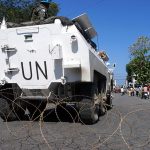
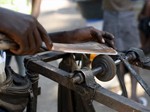
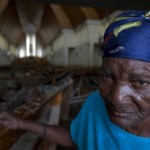
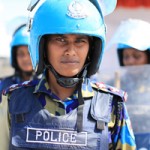

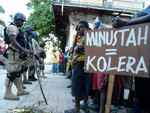
Comments
Nobel Prize Laureates and Prominent Latin Americans Demand UN Mission Withdrawal from Haiti — No Comments